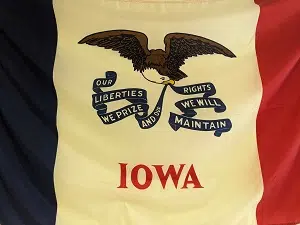(State) Iowans have approved a constitutional amendment changing language on voter age and citizenship requirements, the Associated Press has projected.
The news organization has not yet projected whether the amendment related to the state’s gubernatorial line of succession has been approved.
The first amendment proposal, on voter age and citizenship, was called by the AP as approved at 9:43 p.m., and as of 10:15 p.m., had 76% approval. The AP has not called whether the gubernatorial line of succession amendment has been approved, but the measure is leading with 81% approval as of 10:15 p.m., according to latest results.
This year, Iowans saw two proposed amendments on their ballots. The highest profile piece was on the state’s gubernatorial line of succession – specifically, what happens when a sitting governor leaves office, resigns or passes away. When former Gov. Terry Branstad left office to become U.S. ambassador to China during former President Donald Trump’s administration, then-Lt. Gov. Kim Reynolds took the office.
But Reynolds was not able to formally appoint a new lieutenant governor to fill her vacant role until she was reelected in 2018, because former Attorney General Tom Miller issued a legal opinion in 2017 stating that she had not technically vacated the position of lieutenant governor.
Though Reynolds had appointed former Lt. Gov. Adam Gregg to the position before their 2018 reelection, then-Senate President Jack Whitver would have taken the office of governor if Reynolds had vacated the seat.
The amendment is a change to clarify language in the Iowa State Constitution that when a lieutenant governor takes the position of governor, a vacancy is created in the governor’s former position. The new governor then can appoint a person to fill that role.
Though the measure passed with bipartisan support through two general assemblies, some Democrats brought up concerns about a lack of legislative oversight on who will fill the lieutenant governor position, asking for a Senate approval process for the seat similar to the state procedure for appointing directors of state agencies.
There was also some confusion about the amendment’s role given Gregg’s resignation as lieutenant governor in September. The amendment does not impact Reynolds’ ability to fill this seat – because Reynolds and Gregg were reelected as a ticket in 2022, there was a vacancy left in the lieutenant governor’s office with his departure that Reynolds can fill at will. The governor said she plans to appoint someone to the position in late fall.
The other amendment concerns constitutional language on age and citizenship requirements for voting in Iowa elections. The changes would not alter current Iowa voting laws, but would codify in the constitution that 17-year-olds are allowed to vote in primary elections if they will be age 18 by the general election, as well as officially change the voting age from 21 to 18. These provisions are already in place for Iowa elections.
The other, more controversial component of the constitutional amendment alters the wording that states “every citizen of the United States” who meets voter requirements can participate in elections in Iowa to instead read “only a citizen of the United States” who meets qualifications can participate. It is already currently illegal for noncitizens to participate in U.S. elections.
Though the measure passed with bipartisan support through the Iowa Legislature, there has been a greater focus on citizenship requirements for voting ahead of the 2024 general election. Iowa Secretary of State Paul Pate said in October that 2,022 registered voters in Iowa must cast provisional ballots because they may be noncitizens, as they identified themselves as noncitizens to the Iowa Department of Transportation in the past 12 years. However, voting advocacy groups and some other election officials said that these individuals are likely naturalized citizens who legally have the right to vote, and that Pate’s release discourages immigrant U.S. citizens from participating in the election.
Though other states had voters weigh in on issues from abortion access, marijuana legalization and private school scholarship programs through ballot measures, Iowa has a slightly different system than many states. The only statewide measures that appear on Iowans ballots are constitutional amendments, which must first be passed by lawmakers during two consecutive general assemblies before voters weigh in for final approval in a general election. For the constitution to be amended, a simple majority of voters must approve the language.












